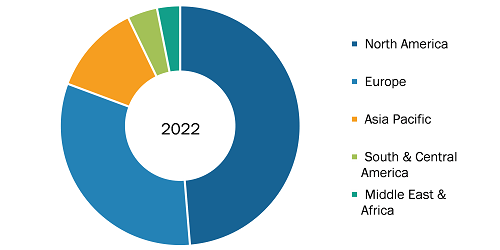Cloud-based Segment Held Largest Share of Teleradiology Services Market in 2022
According to our new research study on “Teleradiology Services Market Forecast to 2030 – Global Analysis – by Deployment Type, Modality, Application, and End User,” the teleradiology services market is expected to grow from US$ 2,392.28 million in 2022 to US$ 8,313.27 million by 2030; it is anticipated to record a CAGR of 16.8% from 2022 to 2030. The report emphasizes the trends prevalent in the global teleradiology services market and drivers and deterrents affecting its growth.
The teleradiology services market is segmented based on deployment type into cloud-based and web-based. In 2022, the cloud-based segment held a larger market share and is expected to record a faster CAGR during 2022–2030. Cloud computing uses various software, data access, and data storage services that do not demand end-user knowledge of the actual physical location and arrangement of services. Cloud computing in radiology is a simply web-based image-sharing platform and includes web-based radiology information system (RIS) modules. Because of the increasing demand for online medical imaging interpretation and a high demand for qualified radiologists, teleradiology has been playing an effective role in providing quick radiology interpretations around the clock. Cloud-based teleradiology enables radiologists to interpret studies from anywhere at any time. It enables emergency STAT interpretations within minutes. The low turn-around time (TAT) has helped improve patient care using Paxera’s cloud-based teleradiology solution. Web applications use a mix of server-side scripts to manage information storage and retrieve client-side scripts to provide useful information. In a web-based application, patients from remote areas can interact with a qualified doctor. They can consult and interact with a doctor through video, text, and voice calls. In addition, patients can view and search the complete list of doctors.
Teleradiology Services Market, by Region, 2022 (%)
Teleradiology Services Market Size and Forecast (2021–2031), Global and Regional Share, Trend, and Growth Opportunity Analysis Report Coverage: Deployment Type (Cloud-based, Web-based), Modality (MRI, CT-Scan, X-ray, Ultrasound, Others), Application (Musculoskeletal System, Gastroentrology, Cardiology, Oncology, Neurology, Others), End User (Hospitals and Clinics, Diagnostic and Imaging Centers, Others), and Geography
Teleradiology Services Market Dynamics and Analysis by 2030
Download Free Sample
Source: The Insight Partners Analysis
The teleradiology services market is segmented based on modality into MRI, CT scan, X-ray, and ultrasound. In 2022, the CT-scan segment held the largest share of the market. The MRI segment is expected to grow fastest from 2022 to 2030. A steep rise in applying CT scans for detecting various diseases and disorders has been observed across several countries. In recent years, computed tomography has witnessed significant technological advancements, including low-dose emergence and automated CT scanners. Technological advancements, such as integrating artificial intelligence (AI) and developing accessories to enhance image quality obtained by conventional CT scanners, are fuelling the segment growth. In May 2021, Siemens Healthineers launched a new CT scanner, Somatom X. It is a high-speed, high-resolution CT scanner with an intelligent operation approach that makes procedures easier for medical staff and patients. In September 2021, GE Healthcare introduced a new CT system, Revolution Ascend, which uses AI to improve operational efficiency and patient comfort. In August 2020, the US Food and Drug Administration (FDA) cleared two Siemens Healthineers AI-based software assistants in the AI-Rad Companion family. Both new software help relieve radiologists from routine activities during MRI exams. The AI-Rad Companion Brain MR for morphometry analysis automatically segments the brain in MRI images, measures brain volume, and marks volume deviations. The AI-Rad Companion Prostate MR for biopsy support automatically segments the prostate on MRI images and enables radiologists to mark lesions, facilitating targeted prostate biopsies.
Moreover, the development of cardiac pacemaker-compatible MRI systems and technological advancements in MRI technologies are expected to propel the growth of the teleradiology services market during the forecast period. MRI can provide early detection of neurological, orthopedic, and cardiovascular conditions that help increase the success rates of the treatment. Therefore, the adoption of MRI is increasing worldwide, accelerating the overall market growth for the segment.
Aster Medical Imaging LLC, RAYUS Radiology Services, ONRAD Inc, medavis GmbH, Real Radiology LLC, Teleradiology Solutions Inc, Vital Radiology Services, Envision Healthcare Corp, Telediagnosys LLC, and Agilus Diagnostics Ltd are a few key companies operating in the teleradiology services market. These companies adopt product innovation strategies to meet evolving customer demands, which allows them to maintain their brand name.
The report segments the teleradiology services market as follows:
The teleradiology services market is bifurcated based on deployment type into cloud-based and web-based. 2022 the cloud-based segment held a larger market share and is expected to grow at a faster CAGR from 2022 to 2030.
The teleradiology services market is segmented based on modality into MRI, CT scan, X-ray, and ultrasound. In 2022, the CT-scan segment held the largest share of the market. The MRI segment is expected to grow fastest during 2022–2030.
By application, the teleradiology services market is segmented into musculoskeletal, gastroenterology, cardiology, oncology, neurology, and others. In 2022, the musculoskeletal segment held the largest share of the market. The musculoskeletal segment is expected to grow fastest from 2022 to 2030.
In terms of end users, the teleradiology services market is segmented into hospitals and clinics, diagnostic and imaging centers, and others. In 2022, the hospitals and clinics segment held the largest share of the market and is expected to grow at the fastest CAGR from 2022 to 2030.
Geographically, the teleradiology services market is segmented into North America (the US, Canada, and Mexico), Europe (the UK, Germany, France, Italy, Spain, and the Rest of Europe), Asia Pacific (China, Japan, India, South Korea, Australia, and the Rest of Asia Pacific), the Middle East & Africa (the UAE, Saudi Arabia, South Africa, and the Rest of Middle East & Africa), and South & Central America (Brazil, Argentina, and the Rest of South & Central America).
Contact Us
Phone: +1-646-491-9876
Email Id: sales@theinsightpartners.com